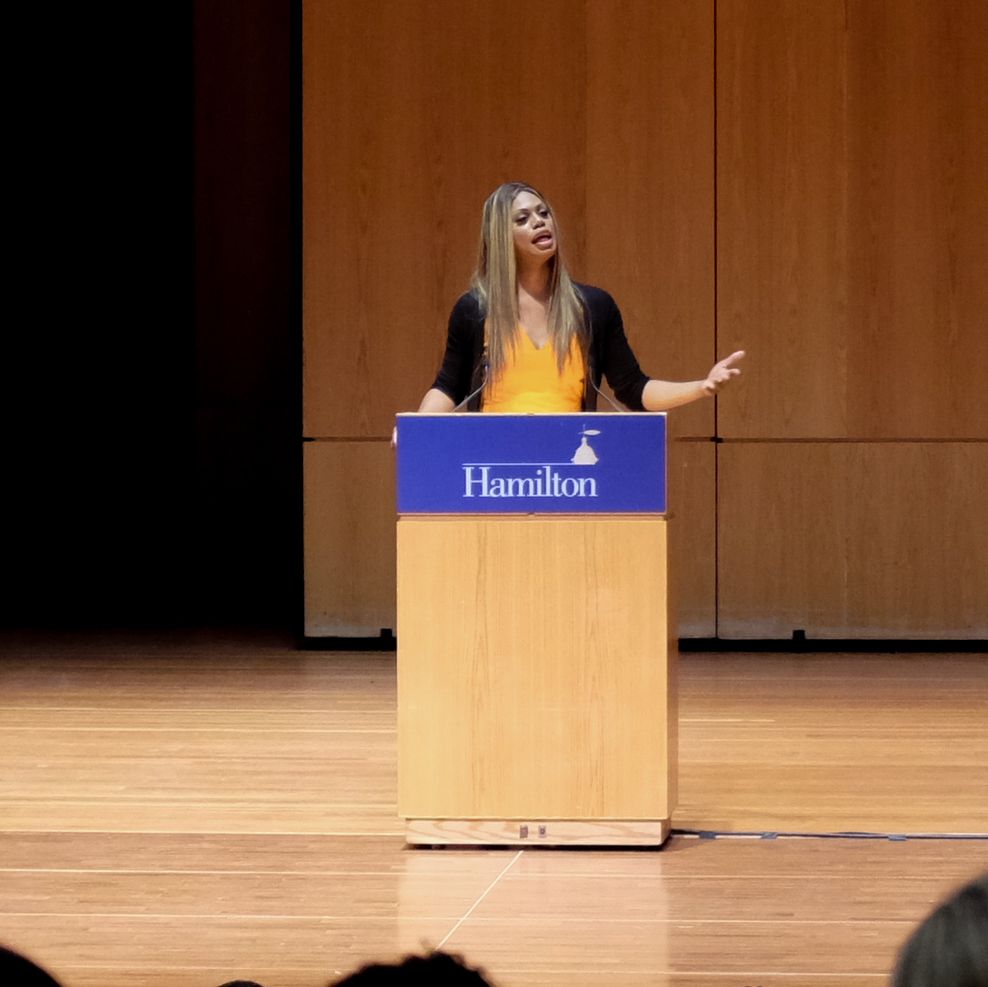
Laverne Cox of Netflix’s Orange is the New Black reminded a Wellin Hall audience of the importance in claiming the intersecting components of one’s multiple identities with pride and creating spaces of independent gender expression in a lecture on Feb. 22. Her talk, the keynote address in the NY6 Spectrum Conference, was titled “Ain’t I a Woman: My Journey to Womanhood.” The actress relayed her experiences as a transgender striving to live authentically: “I stand here tonight claiming my womanhood in a social context that often denies it.”
Amit Taneja, director of diversity & inclusion, introduced Cox after listing her many accomplishments, which include starring and producing Orange is the New Black and becoming the first African-American transgender woman to produce and star in her own show on VH1,“TRANSForm Me.”
Cox illustrated the intertwining nature of oppression found in race, class and gender by divulging her own struggle growing up in a working class family in Mobile, Ala. Born in a place symbolic of the nation’s Civil Rights struggle, Cox learned from a young age of “racial oppression and the resistance to that oppression,” which manifested itself into the deep and complicated history of her culture. That knowledge influenced her experience as an African-American high school student on scholarship at a private school; she was surrounded by privileged students who made her “feel less than.”
A self-described “feminine child,” Cox suffered another form of oppression when her peers and authority figures bullied her for her gender expression. In third grade, Cox’s teacher called her mother warning that her “son would be in a dress in New Orleans if we don’t get him therapy right away.” However, the subsequent therapy was “not exploratory, but rather a reinforcement of the gender binary.”
Drawing on the Cornel West quotation, “Never forget that justice is what love looks like in public,” Cox claimed trans people collectively need this love, and this justice, in a society so heavily divided and defined by this gender binary. The binary, Cox found, was amplified by expectations in her school, home, and religion: all places where she was told, “who [she] was authentically, was wrong.”
The hate transgendered individuals face often becomes “internalized,” and Cox herself fought off depression and survived a suicide attempt before fully coming to terms with her gender identity. Cox noted that 41 percent of transgendered individuals attempt suicide today, which highlights her message that not everyone neatly fits into a gender binary; it is up to members of society to individually “create spaces of healing, because oppression hurts.”
After answering personal questions of audience members and giving advice onstage, Cox urged all listeners to develop a critical consciousness in order to become better leaders. One can start, she said, by acknowledging the different “lives and humanities of everyone” and fostering conversations, though perhaps difficult, with love and empathy. Then, Cox said, one will be able to “define what it means to be a man or a woman in our own terms.”
Cox has overcome much adversity in her own journey to womanhood, and as a television actor and producer, still faces obstacles in garnering support for a greater representation of oppressed groups in the media. She proudly exists not as a role model, she clarified, but as a “possibility model” for others facing injustice and continues to use her public platform as a tool for collective social change.
Cox’s lecture was sponsored by the Days-Massolo Center, the Kirkland Endowment and the NY6 Consortium.
